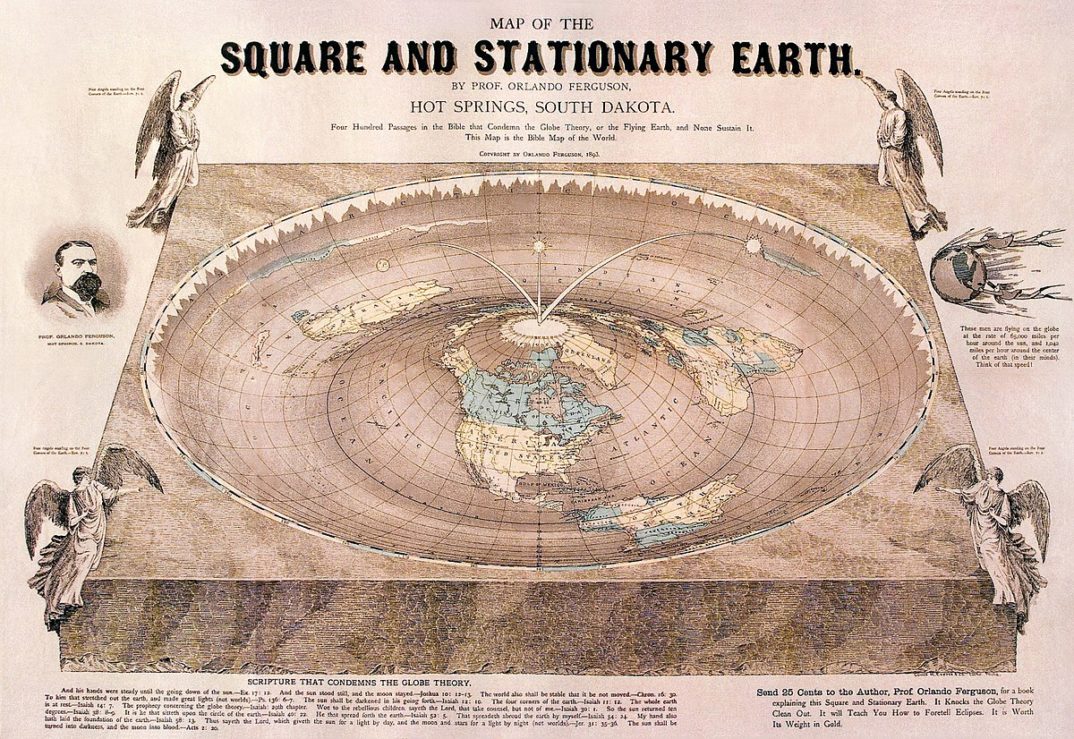What Does Kant Have to Say about Conspiracy Theorists?
The Economist reported last week that more and more Americans are coming to believe the Earth is shaped like a pancake and not like a ball. The report comes as California resident Mike Hughes, hoping to prove our home planet is flat, is finalizing plans to fling himself 1,800 feet into the atmosphere above the desert in a homemade rocket in order to take a snapshot of Earth.
These are just the latest in a recent flurry of flat-Earth blips on our national radar. In January 2016, Atlanta rapper B.o.B. unloosed a torrent of tweets insisting the Earth is flat, attracting the ultimately unheeded Twitter refutations of prominent astrophysicist Neil deGrasse Tyson.
In February 2017, NBA player Kyrie Irving stated in a podcast that he believes the Earth is flat. In the midst of the attendant hubbub, Irving seemed to take it back when he later appeared on a radio show, though it’s unclear whether he admitted to trolling us or to “just asking questions.”
What unites Hughes, B.o.B., Irving and a distressingly high number of others is not so much their belief in a flat Earth, as their belief in a malicious agency hiding that alleged fact (among others) and orchestrating the propagation of convenient myths instead. As Irving said in the podcast, “[W]hat I’ve been taught is that the earth is round, but if you really think about it . . . . I’m telling you, it’s right in front of our faces. They lie to us.”
Conspiracy theorists tend to harbor a deep distrust of accepted explanations that have emerged from public institutions and agencies — accounts of, for example, the fossil record, American space exploration, or the assassination of President John F. Kennedy. Sometimes this distrust is warranted; we’ve learned that the National Security Agency has indeed conducted secret surveillance on millions of Americans.
Conspiracy theorists also have a remarkable ability to absorb, deflect, or explain away any counter-evidence lobbed at them.
Are conspiracy theorists exercising a healthy skepticism or an unhealthy paranoia? Do they see things no one else can, or are they blind to good sense?
The accounts conspiracy theorists peddle almost uniformly forswear contingency, chance, and misfortune. They tend to feature clearly identifiable villains who have the power to set off and control important chains of events. Conspiracy theories can thus be intensely gratifying, for humans crave meaning, tidy explanation, and the settling of responsibility.
Plato gave a vivid articulation of this idea — that reasoning is inherently erotic. To be endowed with reason is to be naturally desirous of understanding. For him, this means we human reasoners strive to acquaint ourselves with the essences of things, strive to apprehend the overriding unity of which diverse and particular things are, we suppose, but partial manifestations. Today this rational eroticism expresses itself, perhaps paradigmatically, in scientific practice, which is guided by the aim of discovering increasingly encompassing laws of nature.
It’s unlikely, though, that any philosopher investigated the erotic, unifying nature of human reason as thoroughly and as bracingly as Immanuel Kant, the title of whose monumental Critique of Pure Reason speaks for itself.
For the most part, Kant shares Plato’s vision of reason as an intellectual power whose proper, healthy exercise involves the incessant search for unifying explanations of why things appear as they do. But Kant complicates that vision. While rightly extolling our ability to systematize, Kant diagnoses many persistent intellectual conflicts as arising from that ability’s susceptibility to abuse. Our reasoning skills run so deep and bear such marvelous fruit, we are liable in some cases to confuse our justifiable interest in finding meaning with an unjustifiable claim that we’ve found it.
And when that happens, Kant thinks, only our reasoning itself can reorient us. Reason is the final authority in matters of thought, the highest tribunal, so the only authority our reasoning can and should submit to is more reasoning. But how do we reason ourselves out of reasoning imperfectly?
As Kant sees it, the authority of reasoning, though final, is not “dictatorial,” concentrated in a single external source. Rather, it is an authority “whose claim is never anything more than the agreement of free citizens.” Indeed, “reason must subject itself to critique in all its undertakings, and cannot, without damaging itself, restrict the freedom of this critique through any prohibition. For there is nothing so important because of its utility, nothing so holy, that it may be exempted from this searching review and inspection” — not even our reasoning capacity itself. And reasoners subject their reasoning to critique by communicating unrestrictedly with other reasoners. As Kant exclaims in a famous essay, “How much and how correctly would we think if we did not think in community with others to whom we communicate our thoughts, and who communicate theirs with us!”
In a later work, Kant articulates three “maxims of common human understanding” that underwrite this communal self-legislation of reasoners: “to think for oneself,” “to think into the place of another [reasoner],” and “to always think consistently with oneself.”
To think for yourself is to commit yourself to refusing to regurgitate others’ ideas without digesting them, without sincerely testing them against your own experience and your own reasoning. To think into the place of others is to commit yourself to “taking account,” imaginatively or through free communication, “of everyone else’s way of representing [. . .] in order as it were to hold your judgment up to human reason as a whole,” ensuring thereby that what you think isn’t just what you think. And to think consistently with yourself is to commit yourself to ferreting out any contradictions and incoherencies that might lie buried in your worldview.
By Kant’s lights (and Plato’s), conspiracy theorists justifiably seek to make sense of coincidental, puzzling, or unspeakable events by trying to show that they’re to be expected or that they’re connected in some hitherto unseen way. It’s natural to entertain accounts of such events by, say, citing the machinations of some covert agency. What’s more, you might think the iconoclasm of conspiracy theorists would be something Kant would condone. After all, he believes that the very health of our reasoning practices is sustained by the freedom to hold anything up to rational scrutiny and by the commitment to avoid merely parroting the ideas of others. Conspiracy theorists, recall, derive mischievous pleasure from questioning “what they tell you.”
However, the conspiracy theorist actually runs afoul of Kant’s ideas. Kant warns that even though it’s natural and healthy for us to seek meaning, and even though we’re pretty good at finding it, my power of reasoning deteriorates as I lose sight of the idea that the meaning I seek might not actually be there, no matter what I or my like-minded friends think. Kant’s “maxims of common human understanding” outline a way to distinguish, in practice, between what is good to think and what only certain individuals or groups think is good to think — a distinction conspiracy theorists are themselves concerned to uphold.
Conspiracy theorists might notice this tension in their worldview — thereby fulfilling Kant’s third maxim (“think consistently”) — if they remembered to balance the first maxim (“think for yourself”) with the second maxim (“think into the place of others”). Only if I engage in good-faith communication with reasoners holding different worldviews will any tensions in my own worldview have a chance to be revealed and corrected and will any of my claims to esoteric knowledge have a chance to be suitably chastened. What’s more, it’s only in taking other reasoners seriously — by working to understand them and by doing my best to test my worldview against theirs — that I may be said to be the genuine author of my thoughts.
We naturally desire understanding, and we reason together in order to find it. Insofar as the authority of our reasoning together isn’t “dictatorial,” there’s no specific understanding, already inscribed, that we’re striving for, nothing specific, laid down in advance, that it’s good to think. What it’s good to think is settled only by reasoning together. The most we can say, Kant argues, is that whatever it’s good to think, it won’t be something dictated by any one person or group, won’t be something we mindlessly ape at one another, and won’t be something we’re prohibited from questioning.
The conspiracy theorist would probably recognize and praise these virtues. But he would also seem to ignore what these virtues imply about his own, idiosyncratic worldview.





